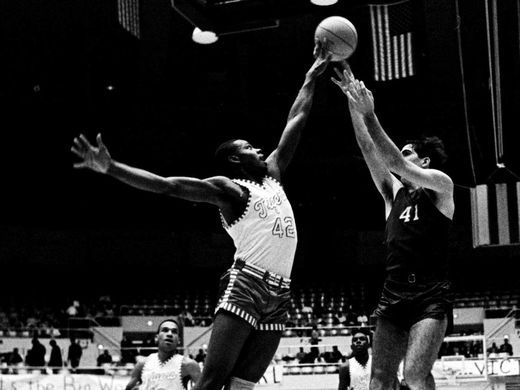It’s that time of year again: March Madness, when even the most casual basketball fan or sports gambler turns his or her attention to college basketball. This is surely one of sport’s most cherished annual traditions, a rite of spring like Daylight Savings Time, Easter bonnets, and crocus and daffodils peaking their heads as the first flowers of the season. But March Madness is surely more than “Bracketology” and office bets. The annual 2+ week extravaganza provides innumerable examples of grit and skill, coupled with demonstrations of sportsmanship that will take one’s breath away.
In my estimation, athletics—particularly team sports—the opportunities for teachable moments are seemingly endless. Prior to the conference championships I came upon a piece that, to me, Shined a light on the very highest aspirations of sports. The journalist John Segeinthaler, now with the Al-Jazeera news organization, pointed out a most heartwarming tidbit about the connection of sports and politics during the run-up to the March Madness frenzy.
As reported in the Tennessean, Nashville’s daily newspaper, during a game with the now Final Four-bound University of South Carolina Gamecocks, the Vandy student-athletes set aside their typical uniforms for ones that Nike made especially for Black History Month. Each jersey featured the name of Civil Rights leader from the “Volunteer State.” The celebration of so-called Equality Weekend marked the 50th anniversary of former Vandy players Perry Wallace and Godfrey Dillard breaking the SEC basketball color barrier, during the 1966-67 season.
The following Civil Rights leaders were honored:
George Barrett: A graduate of Vanderbilt law school who helped integrate Tennessee colleges and universities. He died in 2014.
Mary Frances Berry: Former chairwoman of the U.S. Commission on Civil Rights and first black woman to head a major research university.
Adolpho Birch Jr.: First black chief justice of the Tennessee Supreme Court.
Robert Churchwell: Former Nashville Banner reporter and charter member of the National Association of Black Journalists.
Godfrey Dillard: Along with Perry Wallace, broke the SEC basketball color barrier at Vanderbilt in the 1966-67 season.
Coyness Ennix: Founded Kent School of Law, Nashville’s first law school for black attorneys, and served on the Nashville Board of Education during integration.
Francis Guess: Vietnam veteran and business leader who served on Tennessee Commission on Human Rights and U.S. Commission on Civil Rights.
Sen. Thelma Harper: First black woman elected to the Tennessee Senate and served on Nashville Metro Council.
Bishop Joseph Johnson: First black student both admitted to and who graduated from Vanderbilt. He also became first black member of the Vanderbilt University Board of Trust.
The Rev. James Lawson: Famously led the non-violent protests against Nashville’s segregated lunch counters and helped organize the Freedom Rides in 1968.
Ed Martin: Former Negro League pitcher coached South Carolina State and Tennessee State basketball for a combined 30 years and 11 NCAA Tournament appearances.
Leatrice McKissack: Revered architect whose firm oversaw the design of the National Civil Rights Museum in Memphis, the Tuskegee Airbase and MLK Memorial in Washington, D.C.
Walter Murray: Among Vanderbilt’s first black undergraduates, he was vice president of the Student Government Association and founder of the Afro-American Student Association.
Betty Nixon: Longtime member of the Metro Council, two-time mayoral candidate and the first woman to run a Tennessee statewide campaign, as she served as state director of Walter Mondale’s presidential run in 1984.
Rosetta Miller-Perry: Worked closely with Dr. Martin Luther King Jr. in the Southern Christian Leadership Conference, founded the Tennessee Tribune to cover the black community in Nashville and established the Greater Nashville Black Chamber of Commerce.
Dorothy Phillips: In 1967, she became the first black woman to receive an undergraduate degree from Vanderbilt. In 2016, Vanderbilt created a new chair to promote diversity and inclusion and named it in Phillips’ honor.
Richard and Gertrude Rempfer: White professors at Fisk University, the couple aided students in the civil rights movement. They attempted to enroll their children in black schools to fight segregation.
John Seigenthaler: Served 43 years as an award-winning journalist at The Tennessean, advocated civil rights in U.S. Justice Department and founded the First Amendment Center.
Kelly Miller Smith: Longtime Baptist minister, president of the Nashville NAACP, founder of the Nashville Christian Leadership Conference and founding member of the Nashville Urban League.
Ed Temple: One of the most successful coaches in American sports history, leading Tennessee State women’s track and field to 34 national championships. A statue memorializing Temple was unveiled near First Tennessee Park in 2015.
Perry Wallace: Along with Godfrey Dillard, broke the SEC basketball color barrier at Vanderbilt in the 1966-67 season. Wallace was the first black scholarship SEC player in any sport to play a full four-year career.
Photo of Perry Wallace courtesy of Nashville Tennessean

